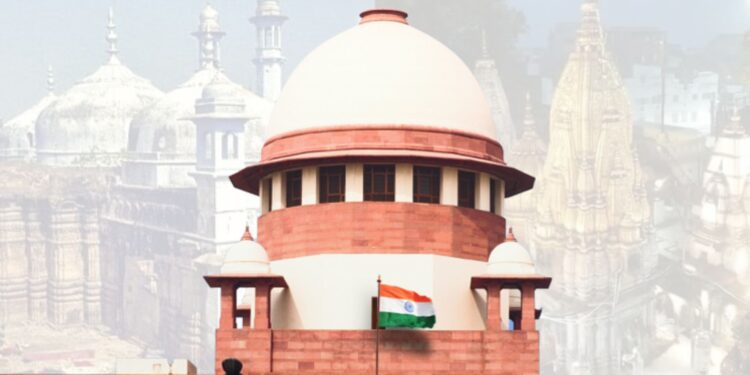A plea has been filed in the Supreme Court seeking the transfer of fifteen pending cases related to the Kashi Vishwanath Temple-Gyanvapi Mosque dispute to the Allahabad High Court.
A Bench of Justices Surya Kant and Ujjal Bhuyan issued notice on the plea. It indicated that the issue of whether High Courts should function as an appellate forum to assess and evaluate evidence will be considered.
The Bench was hearing an interim application in an appeal filed by the Muslim parties against the Allahabad High Court’s decision. The High Court upheld a Varanasi court order from January 31 allowing Hindu parties to offer prayers in the southern cellar of the Gyanvapi Mosque. The High Court had ruled that it was illegal for the Uttar Pradesh government to prevent Hindu prayers through an oral order in 1993.
In April, the Supreme Court declined to stay the Varanasi court order, directing the parties to maintain the status quo at the Gyanvapi site. The Court stated that, for the time being, the Hindu priest conducting the puja would enter from the southern side to pray in the cellar, while Muslims would continue praying in the northern section, where they usually enter.
Senior Advocate Shyam Divan, representing one of the parties, argued that transferring the cases to the High Court would help prevent conflicting orders and allow a three-judge bench to decide the matter comprehensively.
Opposing the transfer, Senior Advocate Huzefa Ahmadi contended that such a move could set a precedent for transferring similar disputes across the country to High Courts, potentially overburdening them. He also noted that some of the issues in these cases, including the Archaeological Survey of India (ASI) survey and disputes over sealed areas of the Gyanvapi complex, were already pending in higher courts. Ahmadi further argued that the cases might violate the Places of Worship Act of 1991, which preserves the status quo of religious sites as they were on August 15, 1947.
The Court decided to list all related cases together for a hearing on December 17.
This matter stems from a civil court case involving conflicting claims over the religious character of the Gyanvapi compound. The Hindu side asserts that Hindu prayers were offered in the Mosque’s cellar by the family of Somnath Vyas until 1993 when the Mulayam Singh Yadav-led government allegedly halted it. The Muslim side disputes this claim, asserting that Muslims have always held possession of the Mosque.
The primary dispute involves the Hindu side’s claim that a portion of an ancient temple on the land was destroyed during the Mughal emperor Aurangzeb’s rule in the 17th century. The Muslim side, however, maintains that the Mosque predates Aurangzeb’s reign and has undergone various alterations over time.
The Hindu parties argue that the land’s religious character remained unchanged despite the destruction of the temple and the construction of the Mosque. They seek the restoration of the ancient Vishweshwar temple on the site and defend their 1991 suit on the grounds that the dispute predates the Places of Worship Act.

















